Part 2 of 4.
One striking feature about the recent promotions of the Geneva Bible is the reworking of church history. They depict a tyrannical King James who oppressed freedom loving Puritans and how the Geneva Bible played a pivotal role in the emergence of democracy in America, but history is more complicated than that.
The website for Studylight.org claims:
The notes also infuriated King James, since they allowed disobedience to tyrannical kings. King James went so far as to make ownership of the Geneva Bible a felony. He then proceeded to make his own version of the Bible, but without the marginal notes that had so disturbed him. Consequently, during King James’s reign, and into the reign of Charles I, the Geneva Bible was gradually replaced by the King James Bible. (Emphasis added; Source)
In a similar vein we find Kirk Cameron claiming:
The English church had become little more than an arm of the State, and the English Reformation was losing steam. Just then The Geneva Bible was providentially unleashed on a dark, discouraged, downtrodden people, and it was the spark for a Christian Reformation of life and culture the likes of which the world had never seen. (Emphasis added; Source)
It would not be accurate to describe the Puritans as a freedom loving people. There is a theocratic streak in the Puritan Project. For example, in Scotland a law was passed mandating that everyone over a certain income purchase a copy of the Geneva Bible! It seems to this writer that what the neo-Reformed are attempting to do is reimagine the past to advance their theological agenda.

Stoolball equipment from modern day reenactment event.
Because of their strict biblicism the Pilgrims had a restrictive understanding of culture. This can be seen in their views on Christmas which they saw as a Romish invention lacking biblical support and therefore contrary to the Christian way of life.
Nathaniel Philbrick in Mayflower (2006) described the first Christmas in the New World:
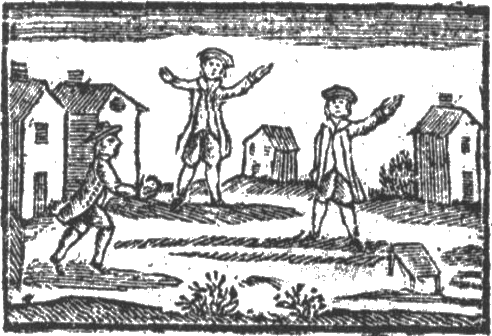 For the Pilgrims, Christmas was a day just like any other; for most of the Strangers from the Fortune, on the other hand, it was a religious holiday, and they informed Bradford that it was “against their consciences” to work on Christmas. Bradford begrudgingly gave them the day off and led the rest of the men out for the usual day’s work. But when they returned at noon, they found the once placid streets of Plymouth in a state of joyous bedlam. The Strangers were playing games, including stool ball, a cricketlike game popular in the west of England. This was typical of how most Englishmen spent Christmas, but this was not the way the members of a pious Puritan community were to conduct themselves. Bradford proceeded to confiscate the gamesters’ balls and bats. It was not fair, he insisted, that some played while others worked. If they wanted to spend Christmas praying quietly at home, that was fine by him; “but there should be no gaming or reveling in the streets.” (p. 128)
For the Pilgrims, Christmas was a day just like any other; for most of the Strangers from the Fortune, on the other hand, it was a religious holiday, and they informed Bradford that it was “against their consciences” to work on Christmas. Bradford begrudgingly gave them the day off and led the rest of the men out for the usual day’s work. But when they returned at noon, they found the once placid streets of Plymouth in a state of joyous bedlam. The Strangers were playing games, including stool ball, a cricketlike game popular in the west of England. This was typical of how most Englishmen spent Christmas, but this was not the way the members of a pious Puritan community were to conduct themselves. Bradford proceeded to confiscate the gamesters’ balls and bats. It was not fair, he insisted, that some played while others worked. If they wanted to spend Christmas praying quietly at home, that was fine by him; “but there should be no gaming or reveling in the streets.” (p. 128)
This highly disciplined lifestyle was not a fluke but a consequence of the Pilgrims’ attempt to literally follow Paul’s admonition “come out among them, and be separate.” The Pilgrims (aka Separatists) were Puritans who believed that the Church of England was not a true church of Christ. In light of this they believed they needed to form their own church of visible saints. This quest for a pure church required not only a disciplined lifestyle based on the Bible but also the excommunication of those who strayed from the path of righteousness. (See Philbrick p. 12)
The Geneva Bible and the City on a Hill
The Cambridge Geneva Bible of 1591 was the edition carried by the Pilgrims when they fled to America. As such, it directly provided much of the genius and inspiration which carried those courageous and faithful souls through their trials, and provided the spiritual, intellectual and legal basis for establishment and flourishing of the colonies. Thus, it became the foundation for establishment of the American Nation. (Emphasis added; Source: Studylight.org)
When the Puritans’ attempt to reform English society was stymied, a renewed attempt was made in the New World. Puritan New England was not so much a retreat as it was a utopian quest. The Puritans believed themselves to be God’s elect like Old Testament Israel. Governor John Winthrop’s seminal sermon “A Modell of Christian Charity” and the imagery of the Massachusetts Bay Colony as a “city upon a hill” that would be a shining example to all the world reflected the confluence of federal theology’s emphasis on the church as covenanted society and post-millennialist eschatology which anticipated the revealing of God’s glory on earth through his elect nation. Later it would be transformed into the founding myth of the United States of America. (See Robert Bellah’s Broken Covenant, Chapter 1 “America’s Myth of Origin.”)
Recent publicity materials claim the Geneva Bible was the foundational text for Puritan New England. But that was not the case. There were two English bibles used in New England: the Geneva Bible and the King James Version (aka the Authorized Version). It was a common practice for ministers to use the King James Version in their printed sermons in addition to their free rendering of the Greek and Hebrew texts (Note 4, Stout 1982:35).
The presence of the two English translations was consequential for that tiny community. The dilemma of the New England way lay in the attempt to fuse corporate solidarity based on Old Testament theocracy with the Protestant insistence on the salvation of the individual soul by free grace. The Geneva Bible’s commentary notes encouraged a spiritualized reading of Old Testament Israel, while the King James Version’s lack of commentary opened up exegetical space for theocratic readings. The King James Version was more popular in the Bay Colony while the Geneva Bible was more popular among the Pilgrims down in Plymouth Plantation. The Pilgrims’ emphasis on free grace provided them with no cultural glue leading to withdrawal and stagnation (Stout 1982:29; Ahlstrom 1975:186-187). Due to their inability to flourish, the Plymouth colony was made part of the Massachusetts colony in 1691.
The Geneva Bible played a role in the Antinomian controversy that rocked the New England colony from 1636 to 1638. Anne Hutchinson favored the Geneva Bible which allowed for a more spiritualized reading. During the court proceedings she was able to recite verbatim extensive excerpts from the Geneva Bible (Stout 1982:31). Her ally, George Wheelwright, used the Genevan translation of Matthew 9:15 for his controversial Fast Day sermon to trumpet the covenant of grace over the covenant of works (the underpinning of the New England polity).
It has been noted that the Geneva Bible had undergone multiple reprint editions from 1576 to 1644. This raises the question about the cessation of publication after 1644. I suggest that 1644 correlated with the waning enthusiasm for the Puritan Project. The Puritan Project was based on the notion of the church as a covenant community made up of believers able to testify to converting grace. However, a new generation emerged of church attendees unable to testify to a definite conversion experience. The Half Way Covenant was adopted in 1657 as way of accommodating the decline in spiritual fervor of its members and as a way enabling the church to retain influence in society (Ahlstrom 1975:108-110). As religious fervor in New England waned so did the demand for the Geneva Bible. By 1700, enthusiasm for the Puritan project had given way to the more moderate Congregationalism.
By the time of the Declaration of Independence in 1776, we find a very different America from the one the Puritans knew. While Puritan New England figures quite prominently in the founding myth of the United States, it is important to keep in mind that the source of American democracy is quite complex. It includes the religious tolerance of Roger Williams’ Rhode Island and William Penn’s Pennsylvania, John Locke’s liberal philosophy, Thomas Jefferson’s rationalism, and the more radical views of men like Thomas Paine and Benjamin Franklin. It is important that we approach history critically even as we affirm God’s sovereignty over human affairs.
The Rise and Fall of the Geneva Bible
The Geneva Bible was at one time the most influential Bible for English speaking Protestants. This was the Bible used by William Shakespeare, Oliver Cromwell, John Knox, John Donne, and John Bunyan. Thus, its influence on English culture was considerable. So why then did it become the forgotten Bible of Protestantism?
The decline can be traced to three factors. One was the lack of official support. The Geneva Bible was produced in the Genevan republic, not in England where the crown was the supreme authority. This republican bias is evident in its commentary that decried tyranny and encouraged revolution against tyranny. For example, the commentary to Exodus 1, especially verse 19, noted the lawfulness of the midwives’ disobedience to Pharaoh. Comments like these were likely to displease King James and his royalist supporters. But there is no evidence of King James ever banning the Geneva Bible. Those who make this assertion seem to have their history mixed up.
Another contributing factor was the growing radicalism of English Puritanism. When it first came out, the Geneva Bible gave very little attention to the concept of covenant and the covenant as the basis for national unity. It was the product of two exiled Englishmen concerned with promoting personal faith in Christ in the face of the Roman Catholic emphasis on salvation through the Church. By the early 1600s England’s break from Rome was more or less an accomplished fact. Attention then shifted to the more ambitious goal of “building an entire social order according to scriptural blueprint” (Stout 19982:25). The growing interest among Puritans in covenant theology (federal theology) from late 1500s to the 1600s began to feed into their desire to reform all of English society in accordance with Scripture. The Geneva Bible’s spiritualizing interpretation of Old Testament passages did not support their emphasis on national covenant. This led, not to its repudiation, as to a quiet neglect by the Puritans.
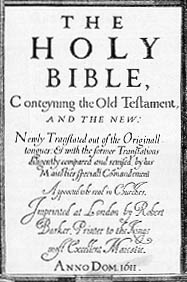 A third factor was the growing popularity of the King James Version. As a result of the growing tensions between the Puritans and the more mainstream Anglicans, the Hampton Court conference was convened. As a result of this meeting King James authorized a new translation that would be known as the King James Version. Unlike the Geneva Bible, the King James Version of 1611 was very much a corporate venture. It was produced under the sponsorship of the monarch and involved the finest Anglican and Puritan scholars of the time. It contained no marginal commentary and only the barest summary of the chapter contents. As part of the ‘Establishment’ at the time, the Puritans had no difficulty accepting the King James Version. Stout notes:
A third factor was the growing popularity of the King James Version. As a result of the growing tensions between the Puritans and the more mainstream Anglicans, the Hampton Court conference was convened. As a result of this meeting King James authorized a new translation that would be known as the King James Version. Unlike the Geneva Bible, the King James Version of 1611 was very much a corporate venture. It was produced under the sponsorship of the monarch and involved the finest Anglican and Puritan scholars of the time. It contained no marginal commentary and only the barest summary of the chapter contents. As part of the ‘Establishment’ at the time, the Puritans had no difficulty accepting the King James Version. Stout notes:
It is not coincidental that the Puritan leaders’ preference for the Authorized Version grew in direct proportion to their growth in numbers and influence (p. 26).
The King James Version surpassed the Geneva Bible in popularity among the Puritan clergymen (Stout 1982:25). This is no surprise given the fact that many Puritans were involved in the making of the King James Version and its outstanding literary style.
Conclusion
The Puritan Project represents an aspect of English Protestantism. But it is important that we do not exaggerate its importance. It flourished from 1570 to 1640 then went into decline. It was replaced by Congregationalism, Unitarianism, revivalism, not to mention the Baptists and Arminians. So while the Geneva Bible played an important role in English Protestantism, its influence would later be eclipsed by the King James Version. Where Geneva Bible was particular to Puritanism, English speaking Protestantism would be more closely identified with the King James Version.
The King James Version became the most popular Protestant version in America until the twentieth century when newer versions like the Revised Standard Version and the New International Version began to challenge its primacy among Protestants.
There is not a little irony in the fact that Christians in the free church tradition like the Baptists are among the fiercest defenders of the King James Version overlooking the fact that their preferred version was sponsored by a monarch who persecuted the Nonconformists! Given modern Evangelicals’ resemblance to Anne Hutchinson and Roger Williams one would expect them to prefer the Geneva Bible. There is also irony in the fact that some neo-Reformed who favor dominion theology also favor the Geneva Bible. If anything, they should be favoring the King James Version like their seventeenth century Puritan predecessors did.
Therefore, church history is not as simple as the promoters of the Geneva Bible make it out to be. It is full of surprising twists and turns, not to mention ironic reverses!
Robert Arakaki
Next: The Geneva Bible compared against the Orthodox Study Bible
References
Ahlstrom, Sydney E. 1975. A Religious History of the American People. Image Books.
Bellah, Robert N. 1975. Broken Covenant: American Civil Religion in Time of Trial. The University of Chicago Press.
Philbrick, Nathaniel. 2006. Mayflower: A Story of Courage, Community, and War. Penguin Books.
Stout, Harry S. 1982. “Word and Order in Colonial New England,” in The Bible in America (pp. 19-37), Nathan O. Hatch and Mark A. Noll, eds. Oxford University Press.
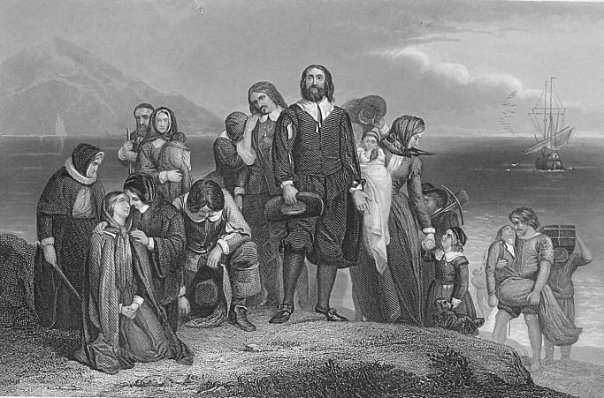
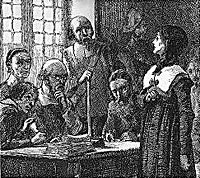
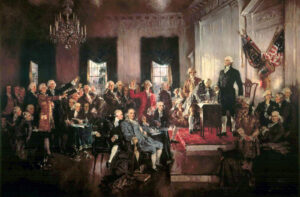
I was raised in an independent Reformed church in 90s, where the New Geneva Study Bible was widely used . . . this bible actually uses the NKJV. I currently use the OSB and hopefully will finish reading it through sometime this fall. It seems somewhat scandalous to me that there isn’t a common English translation that at least most Orthodox agree upon . . . the OSB doesn’t appear to be that. As a tepid inquirer I am rather disappointed in this. I would appreciate your comments on this matter or if you can refer me to articles/sources related to a standard Orthodox English translation.
God bless
Hinterlander,
This is reply is going to be my personal take. I hope that Orthodox clergy reading this will speak to your question.
Basically, if you’re looking for neat and tidy uniformity in Orthodoxy you’re going to be disappointed. While both the Greek Orthodox and the Russian Orthodox use the Liturgy of St. John Chrysostom there are minor differences in the liturgical texts. As a matter of fact even in the same parish I noticed that during Holy Week the priest and the choir will be using different translations. I have to admit it drives me crazy when my translation differs from what the choir is singing! Sigh. Double sigh. 🙂
Please keep in mind that the concern for uniformity is a reflection of modernity’s obsession with rationality. This is based on what I learned from James Scott’s “Seeing Like a State.” Uniformity seems to be characteristic of Western Christianity. The Anglican tradition’s Book of Common Prayer is witness to the concern for uniform worship; except of course when new prayer books come out resulting in church splits. You might be interested in reading up on England’s Act of Uniformity (1662). The Roman Catholic Church’s Novus Ordo Mass (or Vatican II Mass) is another example of the concern for liturgical uniformity. I recently read Veronica Chater’s “Waiting for the Apocalypse” which tells of a hyper-conservative Catholic family trying to flee the Vatican II reforms. That their quest for pre-Vatican II Mass failed is testimony to the immense centralized power of the papacy.
What I noticed is that uniformity is related to centralized power. This tells me that the lack of uniformity that you find unsettling may be a hidden blessing. While Orthodoxy is not all that uniform, there is a profound unity I have not experienced as a Protestant Evangelical. We share the same Greek text of the New Testament and the Septuagint even while our English translations differ. We share in the same texts for the St. Basil’s Liturgy and St. John Chrysostom’s Liturgy even though English translations vary.
Also, keep in mind that once there’s an official standard English tradition, a new dynamic comes into the life of the church. Keep in mind that language change over time and that in the future the time may come when the more conservative element will insist that we keep to the official standard version even when more and more people are unable to comprehend what is being read during the Liturgy. Apparently that is the situation in modern day Greece where because of nationalist politics some insist on katharevousa Greek over the more accessible demotic Greek. Also, insisting on a national standard version infringes on the authority of the local bishop. In light of that it is very impressive that numerous Orthodox bishops from various jurisdictions endorsed the Orthodox Study Bible. This consensus among the bishops speaks more powerfully to me than some announcement coming from the national denominational headquarters.
One last note. A friend asked me what I thought of the ESV. I told him that every translation has its strengths and weaknesses. And that no translation is perfect. But that is not a problem so long as the clergy is able to read and study the Scripture in the original language. If we have an educated and devout Orthodox clergy guiding the faithful into the depths of Scripture, then having a standard English translation shouldn’t be a big issue. But if it is that important to you then you should let your local bishop know what you think.
I hope this answers your question.
Robert
Thank you for the thoughtful and extensive reply to my comments. Your words help clear up what appears to be a faulty understanding I have of what Orthodox mean by tradition.
God bless.
I have a Tolle Lege copy of the Geneva. Two, in fact! I just paid good money (just three-four months ago!) to have one rebound in goatskin, and then… I ran smack into the Church.
Sigh. What’s a fellow to do?
🙂
I appreciate these posts.
This one was great, Robert.
Thank you for this post.
Your article mentions that “Puritans believed themselves to be God’s elect”. Speaking of the elect, our first reading today on the old calendar happened to be Ephesians 1:1-9.
The apostle hits some notes in this chapter that Calvin and the Puritans highlighted, concerning election, predestination, purity and holiness: “1 Paul, an apostle of Jesus Christ by the will of God, to the saints which are at Ephesus, and to the faithful in Christ Jesus: 2 Grace be to you, and peace, from God our Father, and from the Lord Jesus Christ. 3 Blessed be the God and Father of our Lord Jesus Christ, who hath blessed us with all spiritual blessings in heavenly places in Christ: 4 According as he hath chosen us in him before the foundation of the world, that we should be holy and without blame before him in love: 5 Having predestinated us unto the adoption of children by Jesus Christ to himself, according to the good pleasure of his will, 6 To the praise of the glory of his grace, wherein he hath made us accepted in the beloved. 7 In whom we have redemption through his blood, the forgiveness of sins, according to the riches of his grace; 8 Wherein he hath abounded toward us in all wisdom and prudence; 9 Having made known unto us the mystery of his will, according to his good pleasure which he hath purposed in himself” ….
I wonder if you could say a few words on what Orthodoxy makes of words like “predestinated”.
Matthew,
The issue of predestination is a complex one. I’m still doing research on it. Right now I’m comparing the Greek word used in Ephesians 1:5 against other instances where the word is used. In addition, I need to research related words like “elect.” But for now I’ll quote from the Orthodox Study Bible notes on Ephesians 1:4-6:
This is part of a longer quote. I suggest you read the rest of the comment. Many people find the Orthodox Study Bible quite helpful for learning how the Orthodox Church understands Scripture.
Robert
Aha! I just wandered into your archives and see that you’ve already “plucked the TULIP”. No idea what that all means yet, but I look forward to taking it in.
I hope you find the articles helpful.
Robert
Katharevousa Greek is not the same as Koine or liturgical Greek. Koine is taught in high school to all students, so the services in Greece are comprehensible to everyone. Even if it was not taught, the difference between Koine and modern Greek is something like 20%, and between Katharevousa (which is, a pure form of Demotic or modern Greek) and Koine is even less. That is like, the difference between Elizabethan English and modern English.
Ioannis,
Thank you for sharing this. I didn’t know that.
So that means that the average lay person in Greece today understands everything said in the Divine Liturgy?
Robert
It’s a pretty good article, and I say that as one who is usually critical of this site. You wrote,
***It seems to this writer that what the neo-Reformed are attempting to do is reimagine the past to advance their theological agenda.***
I could only sigh in rueful agreement. You have just summarized the essence of 20th century Reformed sociology. I know this all too painfully. I do have one point of contention:
***The growing interest among Puritans in covenant theology (federal theology) from late 1500s to the 1600s began to feed into their desire to reform all of English society in accordance with Scripture. The Geneva Bible’s spiritualizing interpretation of Old Testament passages did not support their emphasis on national covenant. This led, not to its repudiation, as to a quiet neglect by the Puritans.***
I am not so sure this follows. Whether the Puritans (English or New English?) “spiritualized” (in Evangelical circles that is a loaded term), I don’t see how this equates to a downplaying of the national covenant idea. It would only be so if the Puritans sought a 1:1 identification between the covenants of Israel and, for instance, Scotland. But even the most theocratic Puritans denied (at least formally; we can argue consistency later) a 1:1 correspondence, as evidenced in Westminster Confession of Faith, 19:4.
But mostly a good article. I can’t wait to see your comments on the Orthodox Study Bible. I used it for several years and even now have a mostly positive view of it (some of its weaknesses are true of all study bibles). I knwo a lot of EO do not like the OSB, so your comments should prove interesting.
Jacob,
Thanks! I’m glad you like the article.
Just so you don’t get your hopes up too high, my next posting on the Geneva Bible will be comparing the commentary notes of the Geneva Bible and the Orthodox Study Bible. It will use the notes to show the different exegetical traditions that the two bibles follow. Your comments about the shortcomings of the Orthodox Study Bible sounds like something you could do on your site.
And my apologies if you received a notification about an old OrthodoxBridge posting this morning. I tried to clean up something on that posting and my software treated it like a new posting notifying my subscribers! Sigh. I did learn that I could turn off the notification widget.
Robert
I don’t think I received any notification.
I am interested in this subject because I am curious as to how much the English and Scottish Puritans depended on the KJV. I have a hard time imagining that the Scottish Covenanters, who were butchered by prelates and Charles II’s dragoons, endorsed the KJV tradition. But on the other hand, 50 years had passed since the translation and it might have been easier to use it. I simply don’t know.
***commentary notes of the Geneva Bible and the Orthodox Study Bible.***
Even when I was sympathetic to Orthodoxy, I founod the notes incomplete. I was hoping for more glosses by the Fathers. But that’s just me.
They can understand a good 80% of the service. Recently, they introduced the practice of reading the Epistle and Gospel in modern Greek, after they were read in biblical Greek. That, on behalf of the laity mainly, was met with mass resistance. Overall, the people that want to see a change (or at least, wouldn’t mind seeing a change) from biblical Greek to modern Greek are 10% – and they’re all clergy. The overwhelming majority of laity are for the services being done as is. There’s a nice familiarity with many hymns of the liturgical year, especially during Christmas, Theophany, Holy Week, and Dormition. Changing the language means to the people “I don’t know what’s going on now. Church language sounds like the language of the Cafe.”
Obviously, man can never avoid the biases they have even though we try. Mine is that any time I read the words that refer to the U. S. of A. as a democracy then I know someone has been schooled by someone who doesn’t comprehend what the Founders of the U. S. A. had in mind regarding life. liberty and the pursuit of happiness. It certainly wasn’t democracy. They abhorred it and wanted nothing to with it.
I have no scholarly training per se in the Bible, but I have read and studied it and many other historical figures in coming to my belief that man should keep it simple when it comes to faith and God’s laws. I enjoy reading many different versions of the Bible and among one of my most useful is the Geneva Bible 1599, so I thank you for sharing your perspective. I am always open to how others see the world. I have a large distrust of all earthly kings and all the stuff that went on in the reformation from all sides.
Peace be with you and Godspeed.